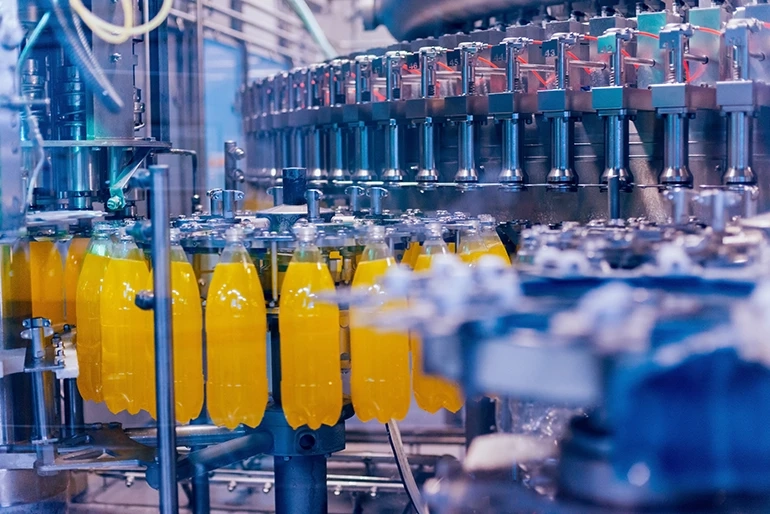In our current system, the food and beverage sector faces numerous challenges, including changing customer preferences, strict regulatory requirements, and complex logistical systems. To maintain a competitive advantage in this rapidly changing field, businesses must use advanced technologies that simplify operations while enhancing flexibility.
What Are The Distinct Advantages That Erp Provides To The Food And Beverage Industry?
ERP for food and beverage industry provides several advantages, including improved management of volatile inventory, efficient adherence to regulations, quality control throughout the supply chain, and enhanced tracing for safety and quality assurance. They simplify the coordination of production planning to match market demands and allow for thorough control of formulas and recipes.
Integrating ERP with Mobility and E-commerce
The digital landscape is undergoing a transformation, which consequently impacts your anticipated standards for availability and efficiency. Your ERP system has evolved from being a mere back-office utility to becoming a crucial participant in your journey into the digital marketplace. Integrating e-commerce into your ERP system ensures that you are ready to engage with your clients online, regardless of the time. With portable access, your ERP system can be used on the go, allowing you to stay agile in a constantly active digital world.
Professionals in the food and beverage sector, such as yourself, are finding that mobile access and ERP e-commerce integration are completely changing the game.
Free Operations: Mobile access ERP systems eliminate the requirement for a continuous physical presence in the office. You have the authority to supervise operations, control inventory, and address customer service queries, all using your mobile device.
Customer Connection: By integrating with e-commerce platforms, you can effortlessly monitor customer activity, handle online orders, and guarantee that the digital browsing experience accurately represents the excellence of your brand.
Immediate Reactions: Technology agility is attained by promptly reacting to market developments, inventory levels, and consumer input, ensuring that your organization remains flexible and adaptable.
The ERP software has the potential to play an important role in driving your market success. The key is not only possessing the technology but also utilizing it to establish more significant relationships, comprehend and anticipate client actions, and optimize your organization's operations for enhanced overall efficiency. To succeed in the food and beverage industry, it is important to embrace the different aspects of your ERP system. This will enable you to compete effectively in a world that is becoming more connected and mobile, where customer happiness and successful operations are of utmost importance.
Why is ERP Accounting Software Important in Today's Landscape?
ERP accounting software are essential in the current company environment because of their wide range of advantages. They streamline operations, boost decision-making, enhance client service, optimize resource management, maintain regulation, strengthen data security, and offer scalability and flexibility. Enterprise Resource Planning (ERP) solutions consolidate data and offer an integrated platform, hence avoiding errors, duplication, and burdensome duties. This streamlined methodology improves productivity, effectiveness, and collaboration, leading to enhanced overall operational performance.
Enterprise Resource Planning (ERP) systems offer immediate access to critical business data and KPIs, facilitating well-informed decision-making across every department of the organization. Managers and executives may make data-driven choices and respond promptly to market developments by obtaining crucial information on sales, inventories, finances, production, and other relevant areas.
ERP accounting software facilitates firms' enhancement of customer service by offering a comprehensive perspective of client information and interactions. This contributes to boosting customer satisfaction and loyalty. Enterprise Resource Planning (ERP) solutions enhance the allocation and usage of resources inside a company, resulting in cost reduction, waste minimization, enhanced production planning, and efficient labour management.
ERP systems are essential for optimizing the supply chain by connecting procedures and data among manufacturers, suppliers, distributors, and retailers. They can integrate compliance characteristics and mechanisms to guarantee compliance with rules governing finance, accounting, quality assurance, data privacy, and other areas.
ERP systems include strong data security capabilities to safeguard sensitive corporate information. These features include centralized information storage, user accessibility controls, information encryption, and regular backups.
ERP systems facilitate collaboration and communication across employees and departments, enabling teams to work together more efficiently on projects, exchange information, and synchronize activities. Organizations can utilize advanced analytics, reporting, and business intelligence tools to extract valuable knowledge from their data, detect patterns, and discover areas for enhancement.
ERP systems are essential in modern company environments because they streamline operations, facilitate decision-making, improve customer service, optimize resource management, maintain compliance, reinforce data security, and provide scalability and flexibility.



